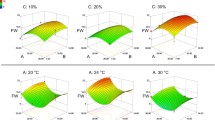Abstract.
The effects of encapsulation on the production of recombinant human proteins by Nicotiana tabacum cells were investigated using alginate, carrageenan, and agar as immobilization matrices. Experiments showed that cell encapsulation in alginate increased the production of human granulocyte-macrophage colony-stimulating factor (GM-CSF) in tobacco cells by approximately 50%. Alginate also yielded the highest quality beads and the most reproducible growth results. The most likely cause for this increased protein production is the altered growth conditions within the alginate beads resulting in a prolonged exponential growth phase. To characterize these effects, we compared growth performance and protein production for various gel geometries, bead sizes, and volume fractions of beads.
Similar content being viewed by others
Author information
Authors and Affiliations
Additional information
Revision received: 24 April 2001
Electronic Publication
Rights and permissions
About this article
Cite this article
Bodeutsch, T., James, E. & Lee, J. The effect of immobilization on recombinant protein production in plant cell culture. Plant Cell Rep 20, 562–566 (2001). https://doi.org/10.1007/s002990100354
Received:
Accepted:
Published:
Issue Date:
DOI: https://doi.org/10.1007/s002990100354




